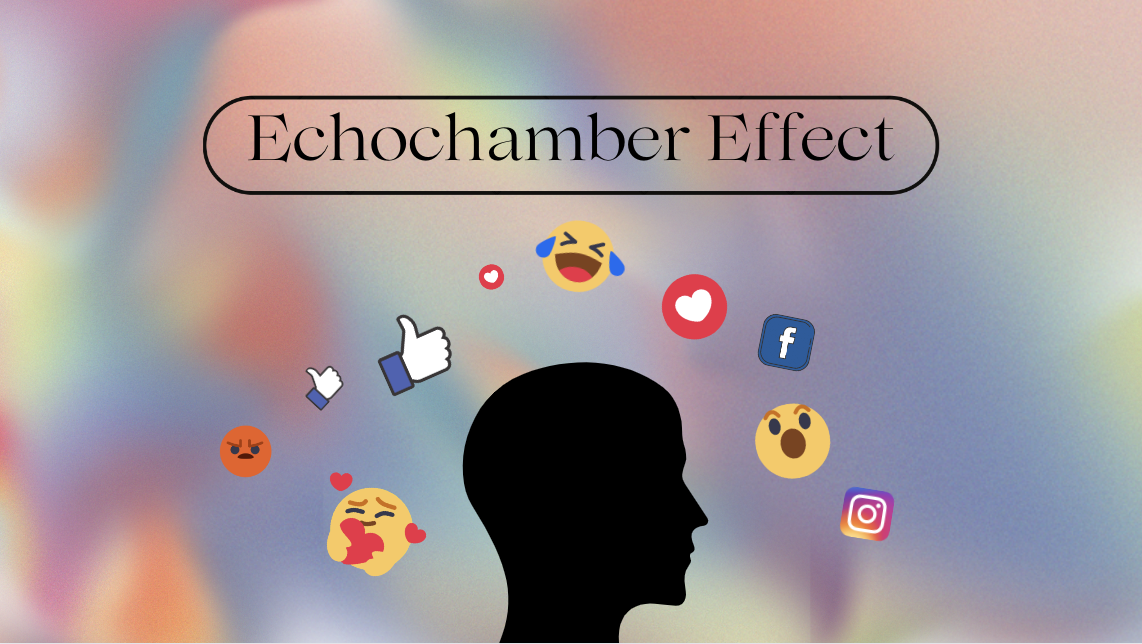The Echo Chamber Effect

Imagine an echo chamber like a world you made up yourself, in which there is only information and ideas that reflect yours. A very friendly example in daily life would be hanging out with a group of close friends. Do differences or similarities in ideas and beliefs sustain friendship? Most of the time, the answer would be the latter. A friend group tends to share the same interests, opinions, and perspectives, creating an echochamber in which members only absorb information that either agrees with or reinforces their original beliefs.
Talking about any groups, including friend groups, organizations, companies, or businesses, it is essential to mention sorting and siloing. Sorting, just like its name, means the natural tendency of humans to sort out friends and choose to be around people who are like them. This tendency is also called the “homophily” principle, which literally means “love of sameness.” Job interviews or college interviews also serve the same purpose: sorting out individuals who are like them. Siloing is the opposite. It is the natural tendency of humans to isolate groups that are different from them. A general example occurs in the workplace, where employees from one department usually would not share their ideas and plans with other departments in the company. The company is like a miniature society in this scenario.
Back to the beginning
The early start for the echo chamber effect began with the printing press. Before the printing press, all texts are handwritten, which consumes a lot of time and effort to be completed, leading to books having high costs that could only be afforded by the wealthy.
Originating from the Age of Enlightenment, the printing press could be seen as the most important revolution of history by standardizing languages, increasing literacy, and spreading ideas. The movable type enables mass text production and lowers the costs of text materials, accelerating the dissemination of knowledge and ideas that has allowed people to form opinions and to be more open to expressing themselves in the age of revolution.
As more and more people not only become aware but also absorb knowledge and ideas, beliefs and ideas spread along with information, the truth. Those with the same ideas and beliefs that bonded and interacted form an echochamber.
The problem is that sometimes people cannot distinguish between ideas and truths, thus leading them to form false perceptions of knowledge and information. This is because they are trapped in the echochamber, where they only hear and see ideas and beliefs that their echochamber is identified with. Social media comes to play. The rapid development of social media platforms, which use algorithms to provide users with content that reflect their interests and beliefs, is posing a threat to the issue mentioned.
Social media: The catalyst of the echo chamber effect
Social media have been developing exponentially. According to the latest data from GSMA Intelligence, a big global source of mobile industry insights, forecasts, and research, a total of 5.18 billion people (64.4 percent of the world’s population) use the Internet at the start of 2023, and almost 83 percent of them use social media every month.
The rapid development of social media platforms has made it a lot easier now for people to get “trapped” in an echo chamber due to their algorithms. Social media algorithms are the backbone of all social networks, which sort out content and show users what they are most likely to be interested in. As a result, social media is usually hard to resist for most people as they are being exposed to tons of their favorite content which aligns the closest to what they like and believe in.
These are examples taken from my own Instagram accounts. Among posts that I followed, “suggested” posts from unfamiliar creators usually are because they align the most with what I am likely to be interested in, who I followed, and what ideas I bias.
Likewise, for those users who tend to be interested in “negative” content, those contents would be amplified across their app because that is what the algorithm is supposed to do. For this reason, social media platforms are posing a big threat to society as more and more teenagers, representatives of future generations, are exposed to negative beliefs.
Is echo chamber effect good or bad?
From previous examples, it is not hard to say that the echo chamber effect exists everywhere around us naturally. Echochamber is inevitable but crucial to sustain and develop a society because without contradicting points of view, there is no change or evolution. However, it is not good to have too much of anything. Intensifying the echo chamber effect would lead to more individuals becoming delusional, a mental in which one cannot tell what is real and what is not. The echo chamber effect is posing a threat to society in the present day due to its amplification through social media, dictatorship, and so on. This is an alert for every individual, including social media users, newsreaders, adults, and kids, to reassess any information they absorbed and learn to question what they hear, see, and read.
References
"Digital Around The World." DataReportal. Accessed May 16, 2023.https://datareportal.com/global-digital-overview#:~:text=Mobile%20stats%20from%20around%20the,over%20the%20past%2012%20months.
Forgeard, Valerie. "The Social Impact of the Printing Press." Brilliantio. Lastmodified November 2021. Accessed May 14, 2023. https://brilliantio.com/the-social-impact-of-the-printing-press/.
Grimes, David Robert. "Echo chambers are dangerous – we must try to break freeof our online bubbles." The Guardian. Last modified December 4, 2017.Accessed May 17, 2023. https://www.theguardian.com/science/blog/2017/dec/04/echo-chambers-are-dangerous-we-must-try-to-break-free-of-our-online-bubbles.
Kenton, Will. "Silo Mentality: Definition in Business, Causes, and Solutions."Investopedia. Last modified November 24, 2020. Accessed May 14, 2023.https://www.investopedia.com/terms/s/silo-mentality.asp#:~:text=A%20silo%20mentality%20is%20the,a%20free%20flow%20of%20information.
"Filter Bubbles and Echo Chambers." Audio. MinuteVideos. Posted December 28,2016. Accessed May 13, 2023. https://www.youtube.com/watch?v=Zk1o2BpC79g.
Newberry, Christina, Eileen Kwok, and Nick Martin. Hootsuite (blog). Entry posted November 7, 2022. Accessed May 18, 2023. https://blog.hootsuite.com/social-media algorithm/#:~:text=Social%20media%20algorithms%20are%20the,most%20likely%20to%20engage%20with.
"Challenge The Echo Chamber." Video. TEDx Talks. Posted April 8, 2019. Accessed May 16, 2023. https://www.youtube.com/watch?v=UKyFL389qe8.